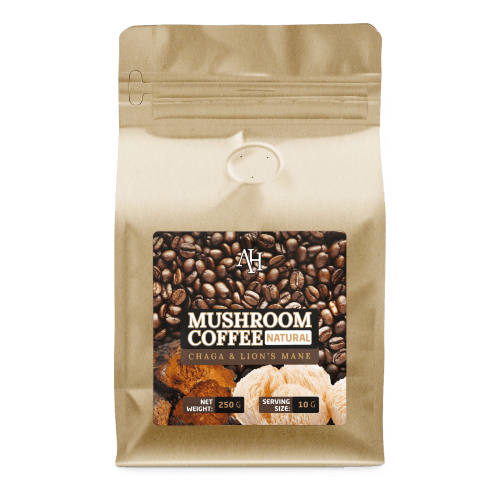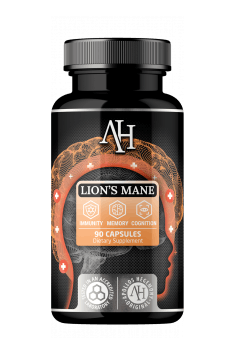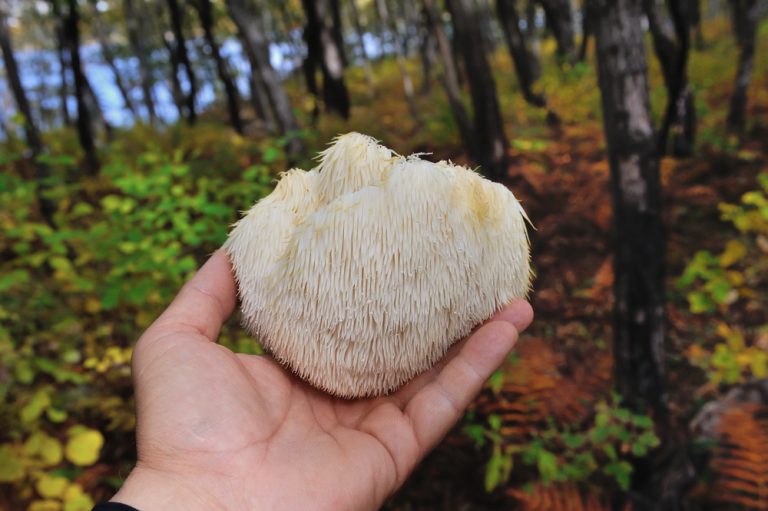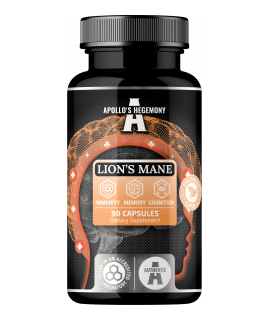Hericium Erinaceus (Lion's Mane) is an edible mushroom that has many health benefits. It is a nootropic superfood that can modulate the immune system and provide many other health benefits. In this article, you will find 15 proven potential benefits of using Lion's Mane and how this mushroom can improve your well-being.
Introduction
Hericium Erinaceus is an edible mushroom that has many medicinal properties. This vital mushroom has been used in traditional Chinese and Japanese medicine for centuries. It is also used in the kitchen of many Asian countries such as Korea and India.
In addition to vitamins and minerals, Lion’s Mane also contains specific compounds such as hericerins, erinacines, erinaceolactones, and certain glycoproteins and polysaccharides.
Ingredients and extracts of Lion’s Mane have proven antibiotic, anticancer, and neuroprotective properties. They can also show potential in regulating the blood glucose level and decreasing the level of body fat. This mushroom also protects against stomach ulcers, relieves anxiety and depression, improves cognitive function, relieves fatigue, and has anti-aging properties.
All of these beneficial effects are based on three properties of this mushroom: inflammation relief, antioxidant properties, and immune system stimulation.
Health benefits of Lion’s Mane
There are just a few human clinical studies related to Hericium Erinaceus but show to be very promising. Therefore, many of the benefits of this mushroom listed below are based on animal studies and are still waiting to be confirmed in human studies.
- Hericium Erinaceus fights depression and anxiety
In a four-week study, menopausal symptoms such as loss of concentration, irritability, palpitations, and anxiety were significantly alleviated with treatment with Lion’s Mane extract. Reduction of these symptoms also improved sleep quality.
Inflammation also plays a role in depression, and compounds in Lion’s Mane reduce the intensity of inflammation states.
Amycenone, a component of Lion’s Mane shown an antidepressant effect on mice.
2. Lion's Mane improves brain function
In Japanese men and women between the ages of 50 and 80 who were diagnosed with mild cognitive impairment, Lion’s Mane extract helped to counteract it. However, cognitive abilities deteriorated again after treatment, so continued intake may be necessary.
What else supports brain function?
In mice suffering from neurodegenerative diseases, Hericium Erinaceus improved both memory and cognitive function.
- Hericium Erinaceus may help in Alzheimer's disease therapy
The mushroom works against dementia in a mouse model of Alzheimer's disease and in humans with mild cognitive impairment.
Levels of acetylcholine (Ach), a neurotransmitter that is responsible for cellular signaling, decline with age. However, in diseases such as Alzheimer's, acetylcholine levels can drop by as much as 90%. The mechanism of action of many drugs that are currently used to treat this disease is based on increasing acetylcholine levels.
In a mouse model of Alzheimer's disease, Lion’s Mane improved cognitive function and cholinergic system functioning in the brain. This in turn improved the levels of both acetylcholine (Ach) and choline acetyltransferase (ChAT), the enzyme that produces acetylcholine in the blood and in the hypothalamus.
In mice with Alzheimer's disease, Lion’s Mane prevented the loss of short-term spatial memory and visual recognition.
Under similar conditions, Hericium Erinaceus lowered the count of beta-amyloid plaques in the brain. These plaques contribute to brain degradation in patients with Alzheimer's disease.
Lion’s Mane has been shown to protect neurons from beta-amyloid-induced neurotoxicity.
4. Lion's Mane may help with Parkinson's disease
In a mouse model of Parkinson's disease, treatment with Lion's Mane reduced dopaminergic cell loss and attenuated motor deficits, indicating that Lion's Mane may slow down the development of Parkinson's disease.
- Hericium Erinaceus improves nerve regeneration
Lion’s Mane has the ability to regenerate nerves and improve nerve growth in animal models, both in the brain and in other parts of the body.
Lion’s Mane promotes nerve regeneration after limb injury in rats. It also promotes the production of Nerve Growth Factor (NGF).
Combining Lion's Mane with Alpha GPC makes a great stack for nervous system regeneration.
6. Lion's Mane boosts the immune system
Compounds found in Lion's Mane improve immune function by raising both the cellular immune response and the humoral immune response. This fungus activates macrophages and NK (Natural Killers) cells.
Hericium Erinaceus polysaccharides raised T-cell and macrophage levels in mice.
Hericium Erinaceus also induces the maturation of human dendritic cells (antigen-presenting immune cells), which can enhance the host's innate immune system. Dendritic cell maturation is an important process in initiating and regulating immune responses.
- Lion’s Mane protects against bacteria
Hericium promotes an antibacterial immune response. In mice infected with a lethal dose of Salmonella typhimurium, it extended life and protected rodents against liver damage.
8.Echinacea can lower high blood glucose levels
Hericium Erinaceus lowered blood glucose levels in both healthy mice and those with diabetes by nearly 50%. It also improved glucose tolerance in diabetic mice.
- Lion's Mane has anti-cancer properties
As early as 1992, studies reported that the substances contained in Lion’s Mane showed high anti-cancer potential. The ingredients extended lifespan and reduced mortality in test animals.

Hericium Erinaceus promotes a Th1 response, which is important for fighting cancer. Echinacea polysaccharides also activate macrophages, and it is a known fact that macrophages are involved in defense against cancer cells.
Hericium Erinaceus inhibits the blood supply to cancer cells and the migration of these cells to other organs (metastasis). In mice, its extract caused cancer cell death and inhibited lung metastasis.
Echinacea also induces cancer cell death in leukemia, colorectal cancer, stomach cancer, and breast cancer.
- Rejuvenating effect of Lion’s Mane
Lipofuscin is a waste product of human and animal aging metabolism. It is constantly accumulated during cellular aging, contributing to cellular atrophy (cachexia). In both mice and flies, the polysaccharides of coneflower significantly reduced the lipofuscin content.
On the other hand, superoxide dismutase (an enzyme that converts reactive oxygen species to harmless oxygen) decreases significantly with age. The polysaccharides of Lion’s Mane may enhance superoxide dismutase activity in the brain and liver.
Hericium Erinaceus has demonstrated anti-aging properties in human bacterial cultures.
11. Lion's Mane has antioxidant properties
Lion's mane has antioxidant properties that prevent diseases associated with oxidative stress. Consuming the cooked mushroom can eliminate peroxidases and remove harmful iron ions.
- Lion’s Mane improves cardiovascular health and metabolism
In rats fed a high-fat diet, Hericium Erinaceus decreased total cholesterol, LDL cholesterol, triglycerides, and phospholipids, and increased HDL cholesterol. Similarly, in mice on a high-fat diet, it reduced weight gain, fat mass, as well as blood and liver triglyceride levels.
In mice lacking ovaries (menopausal model), Hericium Erinaceus reduced body fat, total cholesterol, and leptin. The cholesterol-lowering effect of mushrooms may be related to increased production of short-chain fatty acids in the colon and an accelerated rate of cholesterol degradation to bile acid or reduced-fat absorption capacity.
Hericium Erinaceus also exerts anti-inflammatory effects on macrophages and prevents or attenuates inflammation of adipose tissue associated with obesity.
- Lions mane improves circulation
Extracts of Lion’s Mane may prevent blood clots from forming. A compound called hericenone B that is found in these mushrooms inhibits collagen-induced platelet aggregation in humans and rabbits.
Alcohol extracts of Lion’s Mane mushrooms inhibit the production of excess blood vessel cells in rats. Excess blood vessel cells contribute to atherosclerosis (thickening of the arteries).
- Hericum Erinaceus protects the intestines
Hericum Erinaceus extract protects against gastric epithelial damage and alcohol-induced ulcers in rats.
It also protects against gastritis and colitis by suppressing inflammatory cytokines and reducing intestinal bleeding.
- Lion's Mane protects the liver
Substances contained in Lion’s Mane protected mice from chemically induced liver damage.
Lion's Mane also alleviated liver damage caused by high alcohol consumption in mice by lowering blood levels of ALT, AST, and MDA2.
Safety and side effects of Lion's Man
Some of the studies in rats showed that administration of Lion’s Mane and did not cause adverse effects on behavior, body weight, or blood.
However, one case of allergic dermatitis and one case of severe respiratory failure have been recorded in humans.
Hericum can stimulate a Th1 immune response, so people suffering from autoimmune problems should not use it.
Lion's Mane FAQ
Lion's Mane - where can I buy it?
Nowadays it is not so problematic anymore. Lion's Mane can be obtained in just a few days (no pharmacy necessary!), without having to order it from abroad. Just click here!

Lion's Mane - how to dose it? Application.
The daily dose of Lion's Mane depends on the active ingredients in the product. If you decide on a particular supplement, simply read the manufacturer's description and follow the guidelines. General recommendations range from 500mg to as much as 30,000mg of Lion’s Mane extract - this also depends on the quality of the product and the content of bioactive substances.
Lion’s Mane - contraindications.
A contraindication for the use of Lion's Mane will be the transplantation procedure because it can lead to rejection of the transplanted organ. When using other drugs, it is also advisable to consult your doctor.
Lion's Mane - reviews.
Reviews about Lion's Mane are very positive. Its comprehensive action is confirmed by many studies and by using it, you will certainly experience the effects you expect.








